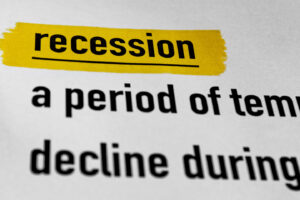Articles & Videos
How do Business Owners Lead Through a Recession?

Managing and leading a business is difficult at the best of times, but with talks of recession looming and businesses still reeling from the impact of world events over recent years, things are far from getting easier.
Business owners of more established companies will be no strangers to recession, in fact it’s a normal part of the economic cycle and since 1857, recessions have happened in the US approximately every three and a quarter years on average and lasted around 17 months although in the post-war period, recessions have typically been less severe and can sometimes last for just a few months.
In reality, we’re likely already in a recession but what does that mean and how have business owners successfully led their organizations through a downturn before?
What is a Recession?
What constitutes a recession may be defined slightly differently country to country, however it’s largely based on significant decline in a country’s economic activity also known as their output or GDP.
In Canada, the C.D. Howe Institute Business Cycle Council has the final say as to whether the country is officially in recession and makes its decision by looking at three factors; how much economic activity declined, how long it lasted and what the impact was cross-sector, taking into account both GDP and employment figures as the main measures of activity. The council’s official definition of a recession is a ‘pronounced, persistent and pervasive decline in aggregate economic activity’.
The U.S. has a similar organization responsible for maintaining a record of peaks and troughs in the economy and a definition of recession commensurate to the Canadian standard. The National Bureau of Economic Research defines a recession as a significant decline in economic activity that is spread across the economy and lasts more than a few months. Importantly however, although the three determining criteria of depth, diffusion and duration need to be met to some degree, it might be that pronounced conditions in one area could offset less severe signals in one of the others; this is the case with the unprecedented pandemic downturn.
According to these definitions, neither the U.S. nor Canada are officially in recession at this moment, but most economists believe it can only be a matter of time and we would suggest that late 2022 going into 2023 will see more challenging conditions for business owners.

Can Business Owners Prepare for Recession?
Whilst it might be difficult to do anything about a recession once you’re in the midst of it, the good news is that businesses can certainly employ strategies to prepare for a downturn in advance and in many cases, the business can come out the other side stronger and more resilient.
In essence, business leaders will need to look at how they maximize cash flow into the business and minimize expenses, albeit strategically, in order to survive and even thrive in a period of recession…
Optimize Cash Flow
- The number one concern for business owners going into a recession is that they may run out of cash. Smaller businesses might be more limited in their access to debt finance as recession bites and creating or adding more to your cash reserves is a sensible way to ensure that your fundamental monthly costs are covered in the event that you start to feel a cash flow crunch.
- Pay down debt so that the business enters the recession in the best possible position with regards to working capital and the money saved on interest can be put into cash reserves.
- Cut back on operating expenses but sensibly. Look at your biggest expenses first and determine whether savings can be made based on the principle that these cost cutting exercises should not be noticed by your customers and should fit with the business’ overall risk tolerance.
- It’s vital to assess current and future workforce needs. Many businesses will feel like it’s too late to do anything other than cut costs and labor being the biggest, the ‘knee-jerk’ reaction could be to reduce the number of full-time employees. That may well be the only solution if businesses haven’t prepared and aligned their staffing needs to their recession strategy. It’s very difficult to source skilled labor in the current climate however and adjusting staff numbers should be broached with care. It may be possible to equip existing employees with new skills that allow them to be utilized differently as the business’ needs change.
Maximize Revenue Streams
- It’s an old adage but it costs less to retain customers than it does to recruit new ones and this is particularly relevant during a recession. Staying close to your customers and understanding their needs will allow you to preserve valuable revenue streams and hopefully benefit from the best kind of advertising – word of mouth, which helps to bring on new clients. Again, demonstrate caution when considering which marketing and promotional activities to cut as ‘out of sight’ generally means ‘out of mind’, even for the most loyal customers.
- Think about how you might open up existing products and services to new customers without investing very much. Consumer habits change during a recession and as they try and conserve cash, they might cut back on discretionary spending or what they perceive to be discretionary spending; more often that not, you may simply need to position something as less luxury and more essential to win sales from bargain-hunting consumers.
- Identify ways to alter your offering so it appeals to a completely different type of customer. Developing a variation on a product or service can open up a more niche market or make it accessible to those that are looking for better value for money.
Qualities Needed to Lead Through Recession
Aside from the practical considerations for business owners, steering a company through recession requires a certain kind of leadership that not all possess. Too often, business leaders will fall into the trap of focusing on the short-term, namely how they meet their obligations day-to-day and month-to-month, without any thought for their people. A remarkable leader will be able to strike a balance between the bottom line and long-term success for themselves and their employees. Employees are often overlooked during a recession and investing in them in the toughest times can improve loyalty once the storm passes.
Here’s a few ways that signify a great leader to their employees in times of recession…
- Foster a sense of safety and reassurance – employees are bombarded with negative information about the happenings in the economy and the one biggest thing you can do is make them feel that at least their position in the workplace is safe and that you’re committed to developing them as you would be at any other time.
- Open communication – people will be looking to you to communicate the direction of the business, in a recession, more than any other time, it’s essential to keep communication open, even over-communicate with regards to the state of the market, the business, the decisions being taken and what it means to them. They’ll appreciate this transparency and the ability to be able to provide feedback more than you realize.
- Praise when it’s due – showing appreciation for a job well done is a simple but effective way to demonstrate your appreciation for people and further than this, celebrating these achievements publicly along with company victories, however large or small, can go a long way to boosting team morale. Building a sense of community helps employees to feel proud of the business and motivate them to persevere together as a team.
- Maintain professional development – it’s just as important to develop your people in a recession as it is at other times. Having some development goals set and regular conversations to review progress and feedback will ensure that your employees remain motivated and reassured that you’re genuinely interested in what they want to achieve. Ongoing personal and professional development is something that your employees will benefit from seeing their leadership habitually do as well; great leaders recognize that they can only be great if they continue to invest in themselves and learn from successes and failures.
Recession Proof Leadership
The COVID-induced recession hit businesses without any prior warning. There have been many economic warning signs for an incoming recession this time. Business leaders that pre plan using worst-case scenarios and apply stringent cash flow hygiene processes can put themselves in a better position but dealing with the practicalities alone won’t be enough.
Being a good leader is not just about profit and procedure, riding out these tough times will require exceptional personal leadership skills.
Sallyport supports many business owners who are trying to navigate these uncertain financial times. There is still time to prepare for the expected downturn – reach out for advice on how to optimize your position, financial and otherwise, for the continued success of your business.
Search
News
$1M Funding Fuels Agri-Business Growth Across Borders
Sallyport is pleased to announce a new partnership with a Canadian agriculture business, providing a $1,000,000 Accounts Receivable facility to…
Read MoreFueling EdTech Growth with $5.5M in Tailored Financing
Sallyport is excited to support a forward-thinking education technology company with a $5.5M combined Asset-Based Lending facility, including Accounts Receivable…
Read MoreArticles
Destination Madagascar for Apparel Businesses?
Madagascar, the fourth largest island in the world, located off the southeastern coast of Africa, has experienced a period of…
Read MorePartnerships that Protect Treasury Management
Treasury management is the process of managing an organization’s financial resources in order to optimize cash flow, minimize financial risk…
Read MoreVideos



